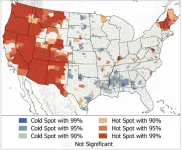(Press-News.org) In the first study to use whole genome sequencing to examine tandem repeat expansions in heart conditions, scientists at The Hospital for Sick Children (SickKids) have laid the groundwork for early detection of and future precision therapies for cardiomyopathy.
Cardiomyopathy is an inherited heart condition that impacts up to one in 500 individuals. The condition affects the structure and function of the heart and can ultimately lead to heart failure.
The SickKids-led study, published in eBioMedicine, part of The Lancet Discovery Science, indicates that tandem repeats – a form of genetic variation – are more often expanded in individuals with cardiomyopathy, and may cause four per cent of cases. Tandem repeat expansions (TREs) are known to contribute to over 60 conditions, often with a hereditary component.
“Previously the extent of TREs involvement in cardiomyopathy was unclear,” says study co-lead Dr. Ryan Yuen, Senior Scientist in the Genetics & Genome Biology program. “We now know another way to identify those who have a higher risk of developing the condition, which may eventually help clinicians diagnose patients, sooner.”
The research team also found a correlation between TREs in the gene DIP2B and a higher risk of developing cardiomyopathy. Uncovering this exact location of TREs could help in the development of precision therapies as part of Precision Child Health, a movement at SickKids to deliver individualized care for every patient.
“The better we understand the genetics of a condition, the more precise our treatments can become, informing care for people with cardiomyopathy and many other conditions with a genetic component,” says co-lead Dr. Seema Mital, Senior Scientist in the Genetics & Genome Biology program, Staff Cardiologist in the Division of Cardiology and Head of Cardiovascular Research at SickKids.
TREs provide new target for cardiomyopathy interventions
The team examined the genomes of 1,200 people with cardiomyopathy. When compared to study participants without a history of heart conditions, Yuen’s team found that tandem repeats that are rarely expanded in people are more present in individuals with cardiomyopathy. Researchers noted tandem repeats in the genes that primarily impact the heart – specifically in the left ventricle, which is responsible for pumping oxygenated blood into the body.
The team also noticed that children of parents with cardiomyopathy had larger TREs, a phenomenon known as “genetic anticipation.” When TREs become larger, there is a higher likelihood that a gene’s function will be disrupted. Larger TREs can also result in earlier onset and harsher symptoms, which is why scientists are investigating how to mitigate their growth.
“Our ultimate goal is to see if there is a way that we can stop or reverse these expansions in order to improve patient outcomes,” Yuen says. “By understanding the mechanism behind TREs, we could help reduce their genetic impact.”
Novel computational methods developed in Yuen’s lab and The Centre for Applied Genomics (TCAG) at SickKids enabled the team to fully examine the genome sequence data to locate exactly where and how large the TREs were in a person’s genome.
“With whole genome sequencing, we can look at TREs in the entire genome to help get a fuller picture of a person’s genetic predisposition,” says Dr. Aleksandra (Sasha) Mitina, a postdoctoral fellow in Yuen’s lab and first author of the study.
Using this technology, Yuen’s future research will apply similar methods to investigate regions of the genome that could help scientists develop treatments for conditions beyond cardiomyopathy.
This research was funded by the Government of Ontario, the Canadian Institutes of Health Research (CIHR), the Azrieli Foundation, the McLaughlin Centre of the University of Toronto, Ted Rogers Centre for Heart Research, the Data Sciences Institute at the University of Toronto, Heart and Stroke Foundation of Ontario, Bitove Foundation, Canada Foundation for Innovation, Genome Canada and SickKids Catalyst Scholar in Genetics.
The research team thanks all families participating in the Heart Centre Biobank registry who helped make this research possible.
END
Whole genome sequencing reveals new genetic marker for cardiomyopathy
2024-02-28
ELSE PRESS RELEASES FROM THIS DATE:
The West is best to spot UFOs
2024-02-28
“This [Tic Tac-shaped object that] had just traveled 60 miles in…less than a minute, was far superior in performance to my brand-new F/A-18F and did not operate with any of the known aerodynamic principles that we expect for objects that fly in our atmosphere.”
In July of 2023, retired commander in the U.S. Navy David Fravor testified to the House Oversight Committee about a mysterious, Tic Tac-shaped object that he and three others observed over the Pacific Ocean in 2004. The congressional hearings riveted ...
Therapy could be effective treatment for non-physical symptoms of menopause
2024-02-28
Interventions such as mindfulness and cognitive behavioural therapy (CBT), could be an effective treatment option for menopause-related mood symptoms, memory and concentration problems, finds a new study by UCL researchers.
The research, published in the Journal of Affective Disorders, is the most up-to-date study of its kind, providing a meta-analysis of 30 studies involving 3,501 women who were going through the menopause in 14 countries, including the UK, USA, Iran, Australia, and China.
Lead author, Professor Aimee Spector (UCL Psychology & Language Sciences), said: “Women can spend a notable number of years in their ...
Artificial intelligence has huge potential in infection control, as long as the right questions are asked and safeguards are in place
2024-02-28
*Please mention the European Congress of Clinical Microbiology and Infectious Diseases (ECCMID 2024, Barcelona, 27-30 April) if using this material*
A new research review to be given at a pre-congress day for this year’s European Congress of Clinical Microbiology and Infectious Diseases (ECCMID 2024) will look at the many ways artificial intelligence can help prevent infectious disease outbreaks including ensuring staff wear personal protective equipment correctly and managing day-to-day hospital activities ...
How artificial intelligence could improve speed and accuracy of response to infectious disease outbreaks in hospitals, and even prevent them
2024-02-28
*Please mention the European Congress of Clinical Microbiology and Infectious Diseases (ECCMID 2024, Barcelona, 27-30 April) if using this material*
A new research review to be given at a pre-congress day for this year’s European Congress of Clinical Microbiology and Infectious Diseases (ECCMID 2024) will highlight the potential artificial intelligence (AI) has to improve the speed and accuracy of investigations into infectious disease outbreaks in hospitals, and potentially provide real time information to stop or prevent them. The talk will be by Dr Jonas Marschall, Division of Infectious Diseases, Washington University School ...
Walleye struggle with changes to timing of spring thaw
2024-02-27
Walleye are one of the most sought-after species in freshwater sportfishing, a delicacy on Midwestern menus and a critically important part of the culture of many Indigenous communities. They are also struggling to survive in the warming waters of the Midwestern United States and Canada.
According to a new study published Feb. 26 in the journal Limnology and Oceanography Letters, part of the problem is that walleye are creatures of habit, and the seasons — especially winter — are changing so fast that this iconic species of freshwater fish can’t keep up.
The timing of walleye spawning ...
New UC Berkeley-led study reveals widen gap on racial inequality in higher education
2024-02-27
A UC Berkeley-led study revealed that disparities in the share of Black and Latino students admitted to America’s elite colleges and universities have endured and even widened over the last 40 years.
The study, "Shifting Tides: The Evolution of Racial Inequality in Higher Education from the 1980s through the 2010s,"(link is external) was published this month in Sage Journals and conducted by a team of researchers from UC Berkeley’s Social Sciences D-Lab, SUNY Polytechnic Institute, University of Arizona and Portland State University. It used four national survey datasets to examine college attendance trends across ...
New study links placental oxygen levels to fetal brain development
2024-02-27
A new study shows oxygenation levels in the placenta, formed during the last three months of fetal development, are an important predictor of cortical growth (development of the outermost layer of the brain or cerebral cortex) and is likely a predictor of childhood cognition and behaviour.
“Many factors can disrupt healthy brain development in utero, and this study demonstrates the placenta is a crucial mediator between maternal health and fetal brain health,” said Emma Duerden, Canada Research Chair in Neuroscience & Learning Disorders ...
Long-term survivors of childhood cancer at higher risk of death following heart issues; threshold for treating risk factors should be lower
2024-02-27
New research out of VCU Massey Comprehensive Cancer Center and VCU Health Pauley Heart Center indicates that survivors of childhood cancer are at a significantly higher risk of death following a major cardiovascular event — including heart failure, heart attack or stroke — than the general public.
The findings – published this week in the Journal of the American College of Cardiology — could fuel advocacy for a paradigm shift in clinical heart health guidelines to address cardiovascular risk factors at an earlier age in childhood cancer survivors.
“We found that the risk of death after a major cardiovascular event in a 50-year-old in the general population ...
Study finds pesticide use linked to Parkinson’s in rocky mountain, great plains region
2024-02-27
EMBARGOED FOR RELEASE UNTIL 4 P.M. ET, TUESDAY, FEBRUARY 27, 2024
MINNEAPOLIS – Pesticides and herbicides used in farming have been linked to Parkinson’s disease in the Rocky Mountain and Great Plains region of the country, according to a preliminary study released today, February 27, 2024, that will be presented at the American Academy of Neurology’s 76th Annual Meeting taking place April 13–18, 2024, in person in Denver and online.
“We used geographic methods to examine the rates ...
Researchers make precious headway into a genetic form of Alzheimer’s disease
2024-02-27
(Santa Barbara, Calif.) — UC Santa Barbara researchers and collaborators in Colombia, Brazil and Germany are progressing toward an understanding of mechanisms that underlie Alzheimer’s disease, in particular an early-onset, genetic form that has afflicted generations of an extended family in Colombia. They also shed some light on a woman from that family who managed to beat the odds.
“What are the chances,” said UCSB neuroscientist Kenneth S. Kosik, a senior author of a paper that appears in the journal Neuron. “It’s unbelievable serendipity.”
It all takes place in the ...


